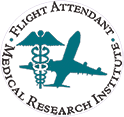Mission Statement
FAMRI’s mission is to sponsor scientific and medical research for the early detection, prevention and cure of diseases and medical conditions caused from exposure to tobacco smoke.
Funding
The settlement award funds research to define the harms caused by such exposure and provide data to fund treatments and cures for these harms. FAMRI has no affiliation with and receives no funding from the tobacco industry and does not support investigators who currently receive funding from tobacco companies.
Animal use in FAMRI research is restricted to mice and rats.
FAMRI dedicates its accomplishments to the flight attendants who worked for decades in tobacco smoke-filled airline cabins. Read more>
Greeting from the Executive Director
Elizabeth A. Kress,
Executive Director
“It is not the years in your life that count; it is the life in your years.” ~Abraham Lincoln
In 1991, the tenor of our lives was revolutionized by the determination of a “hardy band” of never-smoking Flight Attendants and a class action brought in Miami-Dade County on their behalf by Susan and Stanley Rosenblatt, class counsel, against the tobacco industry, seeking justice for damages to their health and wellbeing from flying in smoke-filled cabins. The resulting settlement of $300,000,000 provided for the creation of a research institute dedicated to investigating the medical effects of exposure to secondhand tobacco smoke on non-smokers. This is FAMRI.
FAMRI’s Board of Trustees consists of Fight Attendants who collectively have had over 150 years of flying experience in airline cabins and two attorneys, one of whom, Stanley Rosenblatt, serves as Chair. A Florida attorney, John B. Ostrow, also serves as a Trustee. Before her death in 2021, Susan Rosenblatt served as a Trustee. A Medical Advisory Board made up of world-renowned physicians guides the Board with funding decisions. The American Institute of Biological Sciences (AIBS) provides peer review services for proposals submitted to FAMRI for funding.
FAMRI has funded and continues to fund scientific research at major institutions worldwide and has created bridges for cooperation and collaboration among the projects it funds. More than 4,350 publications from the projects appear in numerous scientific journals. Studies in early diagnosis of illnesses affecting non-smokers from tobacco exposure have saved patients’ lives and opened pathways for further treatments and possible cures.
FAMRI’s research efforts have had far-reaching consequences. For instance, smoking in public places in the United States and other countries is more or less a thing of the past. Secondhand tobacco smoke (SHS) exposure, once believed to be nothing but an annoyance and a nuisance, is now known to be a genuine threat to health, thanks to studies funded by FAMRI. Other funding organizations now provide funding for topics FAMRI introduced, such as sinusitis and COPD. Continuing efforts focus on treatments for the diseases caused by or exacerbated by SHS exposure and the inclusion of such exposures in electronic health records.
The worldwide non-smoking movement began with non-smoking flight attendants dedicated to clearing the air of tobacco smoke in their workplaces. They changed the world!
I invite you to explore each segment on the site about FAMRI’s role in bringing life to our years.
The key for connecting words to menus on the site:
Flight Attendants – Flight Attendants
Susan Rosenblatt –In Memory Of
Medical Advisory Board –Organization & Governance
FAMRI FUNDS SCIENTIFIC RESEARCH FOR THE EARLY DETECTION, TREATMENT, AND CURE OF DISEASES ASSOCIATED WITH TOBACCO SMOKE. FAMRI HAS PROVIDED HISTORICAL AND CURRENT PUBLISHED INFORMATION ON SMOKING AND HEALTH FROM A VARIETY OF PUBLICATIONS AS A RESOURCE FOR THOSE VISITING ITS WEBSITE. FAMRI DOES NOT VOUCH FOR THE ACCURACY OF THIS INFORMATION.
Flight Attendant Medical Research Institute (FAMRI) 2024

